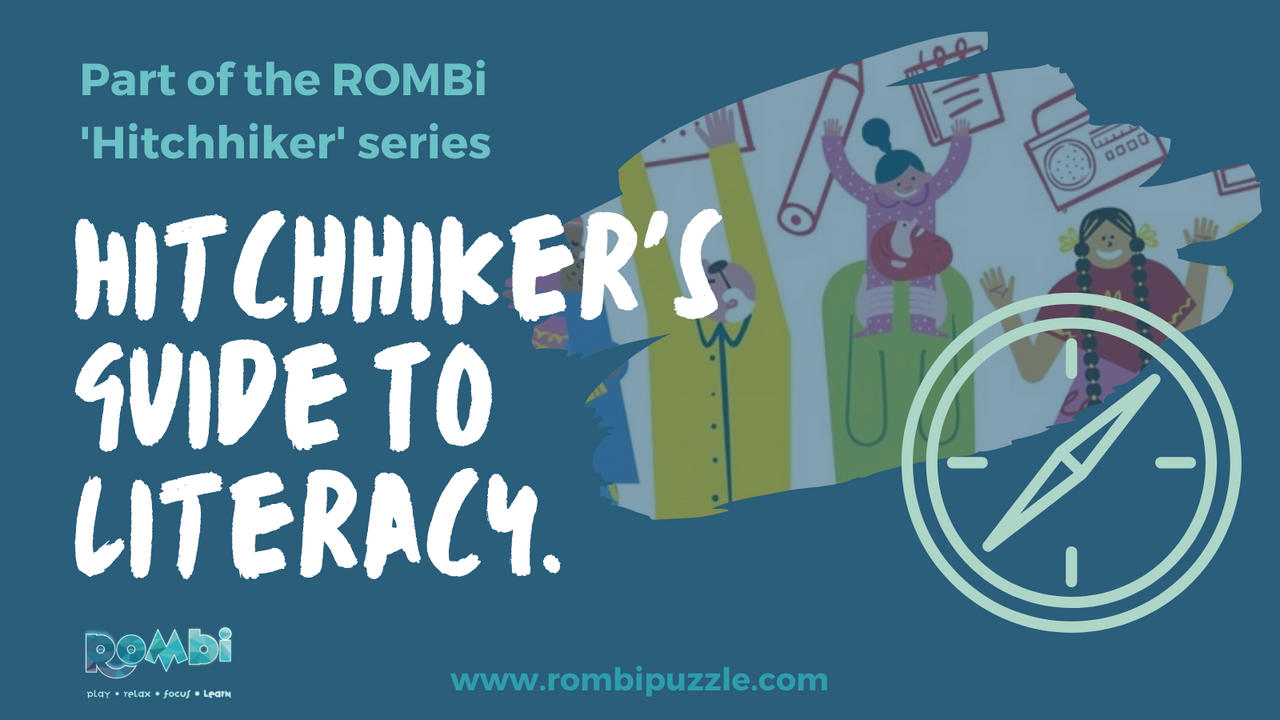Hitchhiker’s Guide To Literacy
As part of this month’s ‘Hitchhiker’s Guide To’ we’re supporting UNESCO’s International Literacy Day and looking at how ROMBi is supporting children and adults with literacy.
International Literacy Day is an annual awareness day which celebrates the importance of literacy worldwide.
UNESCO’s website highlights that over 775 million adults struggle with basic literacy. Celebrating International Literacy Day (ILD) is a great way to raise awareness of the value of literacy and to encourage children and adults to develop their literacy skills.
This year’s focus is on literacy teaching and learning in the COVID-19 crisis and beyond; something we’re very passionate about here at ROMBi.
The awareness day is more relevant than ever to teachers and the challenges of teaching literacy that COVID-19 has brought, especially with remote lessons.
Perceptual Integration
Having access to practical tools and ideas for reducing overwork and enhancing capability is a priority for the challenges of our times, in particular, for our schools; from SEN&D, to mainstream, to transformative CPD for teachers.
ROMBi founder and Educational Specialist, Penny, explains that without perceptual integration, there can be no internal coherence orienting our expression; cultivating this lays the foundations for our mental, physical and aesthetic infrastructure.
Learning is not something that we do, it is happening; things falling into place; with eureka moments, big & small.
This principle is equally relevant for learners across age, academic ability range, from SEN, to mainstream, to FE/HE to workplace skills, to independent learning and self-directed CPD.
Penny’s Research
In 1997 Penny was informed by tutors in the English language and learning support service at university that some of their students had more profound issues in their written work than they could address. Penny was asked to set up a ‘dyslexia’ (SpLD) support service, including dyspraxia, ADHD, and later extended to include autism spectrum conditions and mental health.
This work included, amongst other things, placing around 150 students per semester in 1:1 tutorials.
Tutorials mainly consisted of in-depth study-skills development, including reading & research strategies, mechanics of writing - spelling, grammar, punctuation, sentence structure, paragraph structure, how to write an essay, time management, organisation etc.
Most students who took up the sessions were making steady progress and some were making dramatic improvements in their capacity for effective study.
And some were not making progress, even when working diligently with our most experienced tutors.
The common denominator turned out to be correlated to a formal diagnosis of dyspraxia (DCD), or issues evident in the subtests relating to perceptual organisation. Broadly, the effect of perceptual organisation on information processing & coordination of thought, speech and action in space-time at the most profound levels. Seen in gross and fine motor skills, handwriting, walking into static objects, veering, falling over, organisation of ideas, putting ideas into practice, practical tasks, such as, pattern cutting, sensory overload, voice modulation, discerning social cues and personal space, anxiety – including social anxiety, touch sensitivity, discernment of bodily limits and even toilet training.
One key aspect is that perceptual organisation is what allows the mind to cross-verify data and ideas for coherence, making it possible to routinely discern where there is insufficient information for a decision, rather than introducing confusion that results in undue stress and paralysis. It optimises our information processing, and the effects of this hits multiple registers.
We cannot do without this geometric information, and when it is not coming into awareness via the body, and especially via the hands, (puzzles for structured handplay, manual tasks, clay work, physical movement in play and music) we become over-reliant on language to provide it. Information from exclusively linguistic sources comes with critical issues. Linguistic data is solipsistic – inward looking, is less considered than it claims to be, has or may seem to have internal contradictions, is wrapped up in opinions, may be relevant for the speaker but not necessarily transferable for the listener/reader, and can be highly charged with emotion or other distorting dimensions.
With these issues in mind, Penny commissioned the design of ROMBi to cultivate perceptual organisation/integration.
Structured handplay with ROMBi by lays down new pathways that bypass these issues, and gives a purer and more comprehensive access to the geometric information necessary for effective organisation of ideas.
The nature of the puzzle makes it an experience of steadily increasing autonomy and self-reliance, which is a source of security, jubilation, and a sense of freedom from others.
Case Study
Jessica was formerly a DSA student whose needs assessment Penny conducted in 2010. She hadn't been able to get a job since leaving university and contacted Penny for some advice. Her diagnostic assessment confirmed dyslexia and dyspraxia.
Penny met with Jessica weekly and provided her with a ROMBi, asking her to do a puzzle a day and to write any changes that she noted in a journal. Since then, she reported:
- Becoming able to read for the first time, as her visual perception stabilised – from the first week;
- Her spelling began similar early improvement, the spellchecker now recognises her attempts.
- She is seeing things differently, her mood has improved, she can manage her relationships with others better, and is developing her ability to plan and organise.
ROMBi and Literacy
For intelligence and capability to find expression in organised, coherent, creative forms, learners (regardless of age) need access to relevant structures within their tangible experience.
Regular usage of ROMBi can provide those structures and allows common terms of reference for teachers and learners engaging with key challenges including, wellbeing, personal development, inclusion, behaviour, conflict, intellectual and practical development.


